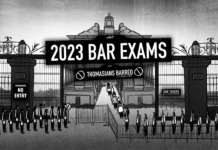Rodrigo Duterte talks tough on drugs and crime and through his murderous speech, incites violence against his foes, including the Catholic Church. But he turns soft and conciliatory toward Beijing despite China having practically grabbed Philippine territory, with some help from that wimp in Malacanang. In contrast, Malaysia’s comebacking 93-year-old Prime Minister Mahathir Mohammad talks with measured tone about the threat China poses on freedom of navigation on the South China Sea, and is firm and steady in voicing his concern about Beijing’s apparent economic enslavement of the region.
Mahathir, who was made an honorary professor of UST during his campus visit and lecture in 2012, recently said he would seek to cancel multibillion-dollar Chinese-backed infrastructure projects that were signed by his predecessor, Najib Razak, as his government works to dig Malaysia out of debt. He made the statement before enplaning to Beijing for a working visit.
Mahathir said he wants to maintain good relations with China and welcomes its investment, so long as the projects benefit Malaysia. But he said the Chinese pipelines and a rail struck by Razak, was putting Malaysia in deep debt. Razak himself faces trial on multiple charges related to the alleged multibillion-dollar looting of the 1MDB state investment fund.
In contrast, the Duterte government has bandied several multi-billion Chinese-funded projects in order to sugarcoat Beijing’s near-aggressive acts, especially its establishment of missile-armed facilities on Philippine marine territory. Duterte has presented the projects as free, when in fact there’s no free lunch. A wake-up call would be the Malaysian example itself.
During his time in office, Razak drew Malaysia closer to China, which sees the multi-ethnic Southeast Asian country as part of its ambitious One Belt, One Road (Obor) global trade initiative. Razak reached deals for the 688-kilometer East Coast Rail Link and two gas pipelines in 2016. The projects have basically benefitted Beijing since they’re being built by Chinese state-backed companies. Malaysia meanwhjile has called for drastic cuts in their ballooning cost, which it estimates at more than $22 billion. Most of the money has already been paid and would be difficult to recover.
Mahathir is obviously alarmed that Malaysia is falling into China’s debt trap, which is what has happened to Sri Lanka. At Beijing’s guidance and prodding, Colombo joined Obor, hoping to boost its global trade tries. But then China started to call on partner-countries like Sri Lanka to invest billions in Obor, saying investments should not purely depend on China. Many of the Obor countries were shocked since they had thought Beijing was cash-rich . Now Sri Lanka has a huge debt of US$64 billion of which US$8 billion is owed to China.
Other Chinese creditors in the region are Cambodia and Indonesia. These countries should ask what Mahathir and Sri Lanka have discovered for themselves quite painfully: What’s the really intention behind the massive loans to countries that China calls its friends? It is a question that seems to escape President Duterte, otherwise known as Peking’s Duck.













